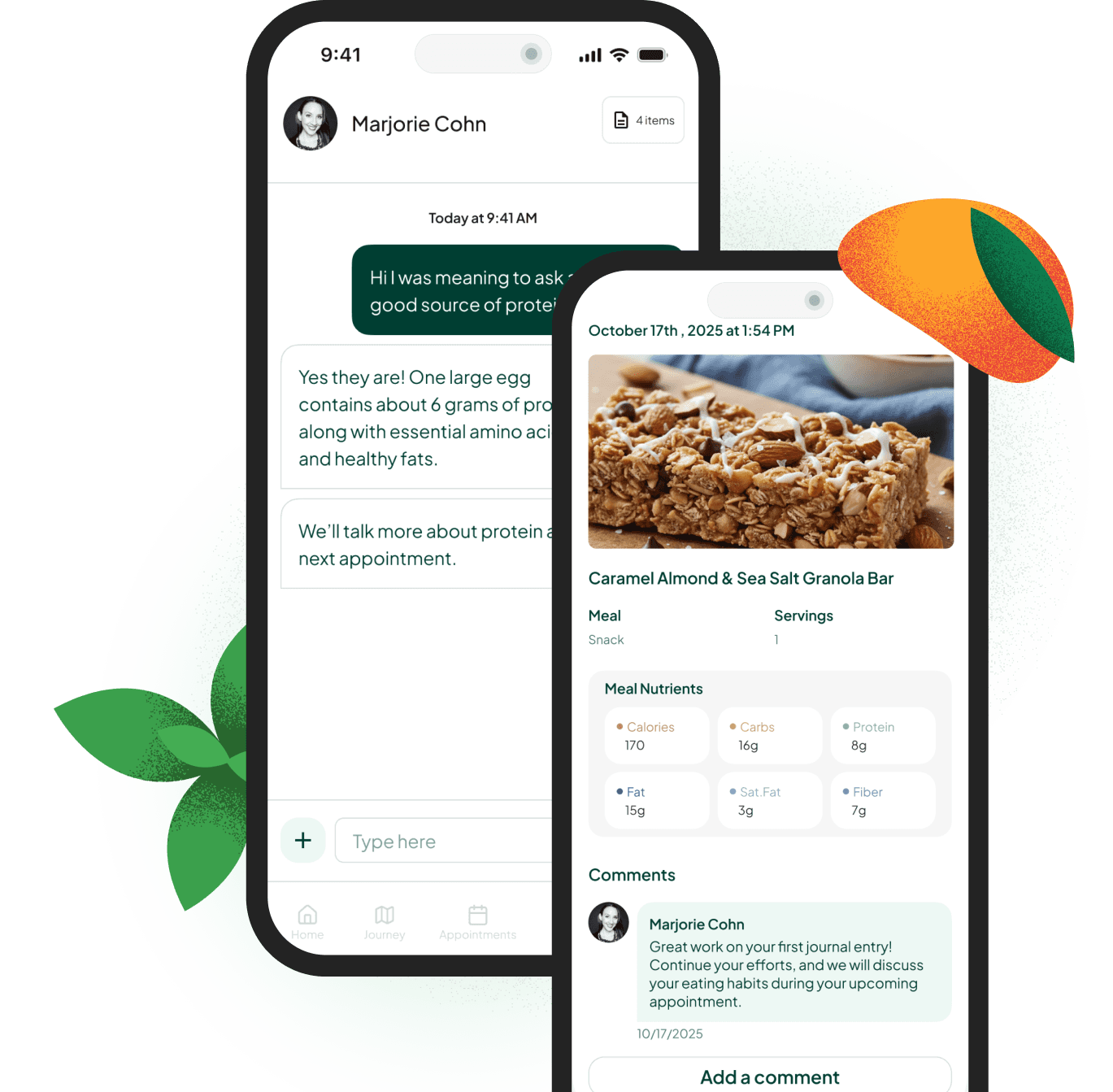Author:
Clinically Reviewed By:
Most people we work with want to eat healthier but aren't sure where to start, especially when time and motivation are low. One of the most effective ways to feel fuller longer, support digestion, and stay energized is by following a high-protein, high-fiber meal plan.
Protein helps build and repair, while fiber keeps things moving and supports gut health. Together, they make meals more satisfying and sustainable.
This article lays out a full high protein meal plan with plenty of fiber, easy meals and snacks, practical tips, and a structure you can actually stick with. No gimmicks, no guesswork.
7‑Day High‑Protein, High‑Fiber Meal Plan
Below is a simple, satisfying 7-day balanced meal plan designed to give you structure without overwhelming your schedule. Each day includes four balanced meals that focus on fiber-rich carbs, lean proteins, and colorful produce.
Day 1
Breakfast: Greek Yogurt Parfait with Berries, Chia Seeds, and Almonds
Layer plain Greek yogurt with fresh or frozen berries, sprinkle in chia seeds, and top with a handful of slivered almonds. It takes less than five minutes to throw together.
You’re getting over 20 grams of protein to keep you energized through the morning, and the berries and chia add fiber, antioxidants, and omega-3 fats.

Snack: Apple Slices with Natural Peanut Butter
The mix of crunchy and creamy makes this a go-to. Slice up a crisp apple and serve it with about two tablespoons of peanut butter.
The fiber in the apple supports gut health, while peanut butter adds protein and healthy fats that help hold you over until your next meal.
Lunch: Lentil and Quinoa Salad with Spinach, Tomatoes, and Feta
You’re getting a lot of nutrients here without much effort. Combine cooked lentils and quinoa with baby spinach, cherry tomatoes, and a small amount of crumbled feta. Add olive oil and lemon juice to brighten it up. The blend of legumes and grains gives you a solid dose of plant-based protein and fiber, and the spinach adds iron and folate.
Dinner: Baked Salmon with Roasted Broccoli and Sweet Potato Wedges
Looking for easy pescatarian meal prep? This one’s for you. Rich in omega-3 fats, salmon supports heart and brain health while providing over 30 grams of protein per serving.
Roast the salmon in the oven at 400°F for about 12–15 minutes, alongside broccoli florets and sweet potato wedges tossed in olive oil. You’re ending the day with a nutrient-packed, colorful plate that tastes as good as it looks.

Day 2
Breakfast: Overnight Oats with Chia Seeds and Peanut Butter
Packed with fiber, protein, and healthy fats, this is a great way to stabilize energy through the morning.
To prep, stir rolled oats, milk (or a plant-based alternative), chia seeds, and a spoonful of peanut butter in a jar or bowl. Let it sit overnight in the fridge. Add berries or sliced banana in the morning for a little sweetness and more fiber.
Snack: Cottage Cheese with Sliced Cucumber and Whole-Grain Crackers
Cottage cheese is high in slow-digesting casein protein, making it perfect for a mid-morning or afternoon boost. Add crunchy cucumber slices and a few whole-grain crackers to round out the snack. You get protein, fiber, and hydration all in one.
Lunch: Chickpea and White Bean Salad with Mixed Greens
You’re looking at around 22 grams of plant protein and over 10 grams of fiber with this combo.
Toss canned chickpeas and white beans with arugula, chopped red bell pepper, cucumbers, and a simple olive oil vinaigrette. It’s filling, colorful, and a great source of prebiotic fiber.
Dinner: Grilled Chicken Breast with Farro Pilaf and Green Beans
Start by cooking farro and mixing it with chopped parsley, lemon zest, and a drizzle of olive oil. Grill or pan-sear a chicken breast and steam some green beans on the side.
The chicken is lean and protein-rich, farro is loaded with fiber and minerals, and green beans bring in antioxidants and crunch.
Day 3
Breakfast: Scrambled Eggs with Spinach, Mushrooms, and Whole-Grain Toast
Eggs give you a full amino acid profile and stay with you longer than a carb-heavy breakfast. Cook two eggs with spinach and mushrooms in a nonstick skillet, then serve with a slice of whole-grain toast. It’s savory, nutrient-dense, and balanced with protein, fiber, and iron.

Snack: Almonds and a Pear
This simple pairing delivers fiber, protein, and healthy fats without any prep. Pears contain soluble fiber that’s great for digestion, and almonds offer magnesium and vitamin E. Just grab and go.
Lunch: Turkey and Black Bean Wrap with Avocado, Lettuce, and Salsa
Lean deli turkey adds high-quality protein, while black beans and avocado boost fiber and keep the wrap satisfying. Use a whole-wheat wrap and layer with lettuce and a spoonful of salsa. Warm it briefly in a pan if you like, or eat it cold. Either way, it’s flavorful and filling.
Dinner: Shrimp Stir-Fry with Brown Rice and Vegetables
Shrimp is quick to cook and naturally low in fat while high in protein. Sauté with garlic, ginger, and any stir-fry veggies you enjoy, like bell peppers, broccoli, or snap peas. Serve over brown rice.
You’ll get antioxidants from the veggies, fiber from the rice, and a light but satisfying way to close out the day.
Day 4
Breakfast: Protein Smoothie with Greek Yogurt, Berries, Spinach, and Flaxseed
Blend ½ cup Greek yogurt, a handful of spinach, mixed frozen berries, ground flaxseed, and your choice of milk. It’s creamy, refreshing, and rich in both protein and fiber.
The berries and flaxseed offer antioxidants and omega-3s, while Greek yogurt and spinach support muscle recovery and gut health.
Snack: Carrot Sticks with Hummus
This combo is simple but effective. Carrots deliver crunch, beta-carotene, and fiber. Hummus, made from chickpeas, adds protein and heart-healthy fats. Scoop a few tablespoons into a container and pair with raw veggie sticks for an easy fiber-rich snack that doesn’t require reheating.

Lunch: Tuna and White Bean Salad over Leafy Greens
High in protein and omega-3s, canned tuna is a great pantry staple. Mix it with white beans, olive oil, lemon juice, and fresh herbs, then serve it over mixed greens. This salad packs over 30 grams of protein and is full of prebiotic fiber, which helps feed beneficial gut bacteria.
Dinner: Turkey Meatballs with Quinoa and Roasted Brussels Sprouts
Make simple baked turkey meatballs using ground turkey, garlic, parsley, and oats as a binder. Serve with cooked quinoa and oven-roasted Brussels sprouts.
The sprouts are especially high in fiber and antioxidants, and quinoa adds plant-based protein along with magnesium and iron.
If you’re looking for a meal plan tailored to your body, digestion, and schedule, we can help. Connect with a Registered Gut Health Dietitian through Berry Street for a personalized 7-day high-protein, high-fiber meal plan built just for you and your needs.
Whether you’re just getting healthier or you want something more specific, such as a vegetarian keto meal plan or a vegan bodybuilding meal plan, we’ve got you covered.
Day 5
Breakfast: Baked Oats with Peanut Butter and Raspberries
Mix oats, mashed banana, egg, milk, peanut butter, and cinnamon, then bake in a ramekin or muffin tin at 350°F for 20 minutes. Top with fresh raspberries.
These baked oats are high in fiber, naturally sweet, and protein-packed. They reheat well, too, so you can make them ahead for a few mornings.
Snack: Greek Yogurt with Flaxseed
Rich in calcium and probiotics, Greek yogurt supports bone health and gut function. Stir in a teaspoon of flaxseed for an extra fiber boost and a subtle nutty flavor. It’s creamy, satisfying, and perfect for a mid-morning or afternoon reset.

Lunch: Farro and White Bean Salad with Roasted Veggies
Toss cooked farro and canned white beans with roasted zucchini, red onion, and bell peppers. Add a drizzle of olive oil and a splash of balsamic vinegar.
Farro brings hearty texture and whole-grain fiber, and the beans provide plant protein and gut-friendly prebiotics.
Dinner: Grilled Tofu with Soba Noodles and Stir-Fried Vegetables
Tofu is a fantastic vegetarian protein source that soaks up flavor beautifully. Grill it or pan-sear until golden, and serve over soba noodles with stir-fried vegetables like bok choy and mushrooms.
The noodles add fiber and slow-burning carbs, while the veggies deliver antioxidants and texture.
Day 6
Breakfast: Cottage Cheese with Pineapple and Chia Seeds
Scoop ½ cup of low-fat cottage cheese into a bowl and top with pineapple chunks and a sprinkle of chia seeds. The tropical flavor is a bonus, but the nutrition is what really delivers.
Cottage cheese gives you steady protein, while pineapple adds vitamin C, and chia boosts fiber and omega-3 content.
Snack: Roasted Chickpeas or Edamame
If you want something crunchy and satisfying, go with roasted chickpeas or a cup of steamed edamame. Both are high in protein and fiber. Edamame also offers iron and folate, while chickpeas provide resistant starch that supports gut health.
Lunch: Chicken and Black Bean Bowl with Brown Rice and Veggies
Start with a base of brown rice, then layer in grilled chicken, seasoned black beans, sautéed peppers, corn, and avocado.
This bowl delivers everything: fiber, protein, and healthy fats. It’s easy to customize with your favorite toppings and works well as a meal prep option.
Dinner: Baked Cod with Lentil Salad and Roasted Carrots
Cod is light, flaky, and rich in lean protein. Bake with lemon and herbs, then serve over a warm lentil salad made with chopped parsley, celery, and vinaigrette. Add a side of roasted carrots for color and fiber. This dinner is simple but nutrient-dense and easy to digest.

Day 7
Breakfast: Raspberry-Peach Smoothie with Greek Yogurt and Walnuts
Blend frozen raspberries and peaches with Greek yogurt, a splash of almond milk, and a few walnuts. This smoothie offers protein, fiber, and healthy fats to start your day on the right foot.
It’s also rich in vitamin C, potassium, and plant compounds that support inflammation balance.
Snack: Apple with Almond Butter
A classic for a reason. Apples are hydrating and high in fiber, and almond butter adds protein and vitamin E. This pairing helps manage blood sugar and keeps energy levels stable between meals.
Lunch: Spinach, Chicken Sausage, and Farro Bowl with Feta
Sauté sliced chicken sausage with garlic and baby spinach, then toss with cooked farro and crumbled feta.
The farro adds whole-grain fiber, the spinach provides iron, and the sausage brings savory flavor and protein. It comes together fast and feels like comfort food.
Dinner: Sheet-Pan Chicken Thighs with Red Cabbage, Sweet Potatoes, and Green Beans
Place bone-in chicken thighs on a sheet pan with chopped sweet potatoes, red cabbage, and green beans. Season with olive oil, paprika, salt, and pepper. Roast at 425°F for 35–40 minutes.
It’s a one-pan meal that’s easy to clean up, rich in fiber, and full of protein and antioxidants from the colorful veggies.

Conclusion
A high-protein, high-fiber meal plan can support energy, digestion, and fullness without sacrificing flavor or variety. By combining foods like legumes, lean proteins, whole grains, fruits, and vegetables, you can build meals that are satisfying and genuinely enjoyable to eat.
From our experience as Registered Dietitians, small shifts like these are what lead to long-term success. If you’re ready for something more tailored to your needs, connect with a Registered Dietitian through Berry Street and get started on your own personalized plan.














